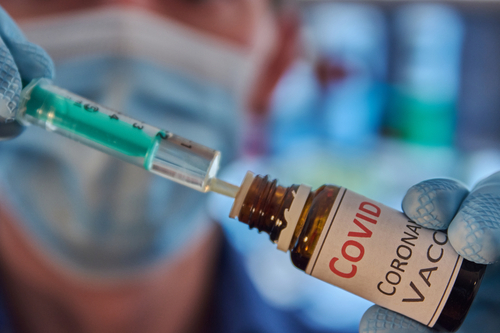
With the distribution of Pfizer’s COVID-19 vaccine underway in the United States and an emergency use authorization (EUA) expected to follow for Moderna’s vaccine this week, the federal government is preparing through massive logistics and additional purchases.
The government’s Operation Warp Speed has paired with private partners to begin distributing 2.9 million Pfizer doses to hundreds of designated sites across the country. The U.S. Departments of Health and Human Services (HHS) and Defense (DoD) have also purchased another 100 million doses of Moderna’s COVID-19 vaccine candidate, mRNA-1273, bringing total purchased doses to 200 million.
These will face ongoing, rolling distribution if the Food and Drug Administration (FDA) approves the vaccine this week, granting doses through June 2021. Moderna began manufacturing the first 100 million doses while clinical trials were still underway.
“Securing another 100 million doses from Moderna by June 2021 further expands our supply of doses across the Operation Warp Speed portfolio of vaccines,” HHS Secretary Alex Azar said. “This new federal purchase can give Americans even greater confidence we will have enough supply to vaccinate all Americans who want it by the second quarter of 2021.”
The major inroads to vaccination come just over 11 months since the virus morphed into a global pandemic, years off the traditional timetable for vaccine turnarounds. Azar stressed that in spite of this speed, safety was not foregone — multiple stages of safety review were still required of the vaccines.
Now, in the case of both the Pfizer and Moderna vaccines, doses will be provided to patients at no cost from the government, and administration costs will be covered by healthcare providers.
“The massive logistical planning our military has contributed to Operation Warp Speed gives me even more pride in the talent and dedication of our service members,” Acting Secretary of Defense Christopher Miller said. “They have been crucial in bringing a safe and effective vaccine to the American people and in restoring the health of our country.”
Dr. Barbara Alexander, president of the Infectious Diseases Society of America (IDSA), agreed that the process has been nothing short of an amazing feat, one to be lauded. However, she also counseled that it is merely a first step — and one that should not be politicized.
“Comments from the FDA’s independent advisory committee members highlight the importance of continuing to collect data and of ongoing study of this vaccine across populations,” Alexander said of the Pfizer vaccine specifically. “Guidance from the CDC’s Advisory Committee on Immunization Practices on allocation and administration of the Pfizer-BioNTech vaccine will be critical to ensuring fairness, efficiency and trust in the process to follow.”
Both the Pfizer and Moderna vaccines are based on messenger RNA (mRNA) instead of viral components. This means they utilize the cellular process by which proteins are made to trigger immune responses and build viral immunities, as opposed to the traditional vaccination methodology, which uses weakened or inactivated versions of viruses to stimulate immune responses and create antibodies.
Pfizer’s vaccine demonstrated a 95 percent efficacy in preventing symptomatic COVID-19, compared to Moderna’s 94 percent effectiveness. Moderna’s vaccine was developed in partnership with the National Institute of Allergy and Infectious Diseases (NIAID). NIAID also supported its nonclinical studies and clinical trials. The Biomedical Advanced Research and Development Authority took things further, supporting phase 2/3 clinical trials, vaccine manufacturing scale up and other developmental needs. Phase three trials are ongoing.
BARDA also collaborated with DoD to provide up to approximately $3.2 billion for expansion of Moderna’s vaccine manufacturing capacity and to deliver the vaccine doses. It is one of many efforts the government is currently undertaking to ramp up the COVID-19 vaccination process in the United States. Still, Alexander notes a right and a wrong way to proceed.
“Plans for the vaccine’s distribution must be open and consistent with the public health needs of communities across the nation awaiting this vaccine,” Alexander said of Pfizer’s vaccine. “Significant increases in funding to ensure equitable allocation and administration as well as education to build vaccine confidence will be essential to seizing this moment.”




